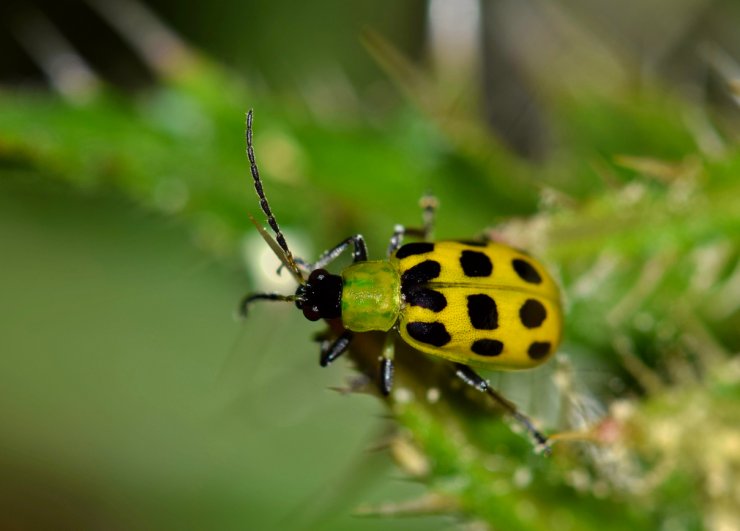
A spotted cucumber beetle.
Pests in your cucumber garden, left unchecked, can damage and destroy your precious cucumber plants. Keeping a close watch on your plants during regular daily inspections will help you spot any pests before they can do irreparable harm.
Spot the symptoms of cucumber plant pests
Check leaves, stems, and fruit for these symptoms that come from pests on the prowl!
On Cucumber Leaves and Stems
| Symptom | Pest |
| Shot holes or netlike appearance on leaves | Cucumber beetles |
| Plant desiccation | Whiteflies |
| Holes in plant leaves | Squash beetles |
| Distorted, curling leaves | Aphids |
| Pale yellow and brownish spots, webs on bottom of leaves | Spider mites |
| Wilted, brown leaves | Squash bugs |
| Hole in stem, sudden wilting | Squash vine borer (rare) |
| Honeydew (white, sticky residue) | Aphids, whiteflies |
| Large, ragged holes or scalloped edges | Slugs, snails |
On Cucumber Fruit
| Symptom | Pest |
| Holes in fruit | Pickleworms |
How to treat pests on cucumber plants
Here are some proven ways to get rid of pests on your cucumber plants. Choose the best treatment for the type of pests invading your plants.
- Pick off the pests. Use your garden gloves to remove the pests by hand. After removal, destroy pests by drowning them in a bucket of soapy water or crushing them with your foot. Handpicking isn’t efficient or practical for very small pests, but works well with larger pests such as the cucumber beetles and slugs.
- Apply insecticidal soap. Insecticidal soap is organic. The potassium salts in insecticidal soap help remove an insect’s protective waxes, causing destruction of insect membranes and killing them. Insecticidal soaps are particularly effective on smaller pests such as aphids, psyllids, and spider mites. Mix the soap with water to create your solution, and apply directly to insects on any plants. While insecticidal soap is less apt to affect other organisms, certain plants might be sensitive to the soap and can suffer leaf burn.
- Apply horticultural oils. Combine plant- or petroleum-based oils with water to produce horticultural sprays. Neem oil, for instance, is derived from seed extracts of the neem plant. Oil-based sprays block an insect’s air holes, interfere with an insect’s metabolism, disrupt insect feeding, and inhibit insect growth. Like insecticidal soaps, horticultural oils can cause plant injury if not properly diluted.
- Make your own pest spray. As noted elsewhere in this collection, you can make your own pest spray with benign materials. Mix one tablespoon of baking soda, 1/2 teaspoon of a mild dish detergent, and 2 1/2 tablespoons of olive oil in a gallon of water to make a solution that will repel all kinds of bugs, as well as a fungicide for blight and mildew on the cucumber plant leaves. Shake it well in your bottle before spraying and repeat every week for it to be continuously effective.
- Plant repellant companion plants. Marigolds, nasturtiums, dill, and oregano growing near your cucumber plants will help keep pests away.
- Use sticky traps. Cucumber beetle traps lure these pesky pests where they get stuck on the sticky sheet. Hang the lure near your cucumbers and replace every three to four weeks in the growing season.
Do pests attack your cucumber plants every year? How do you handle removing them—and even preventing them in the first place? Please tell us how you treat your cucumber plants to avoid pests.


 Previous
Previous

